
The first time I saw Richard Greenberg’s The Violet Hour back in 2008, I wrote, “It’s quite possibly a play requiring a second viewing in order to be fully appreciated.” Having now seen it a second time at Santa Ana’s Theatre Out, I’d like to amend that statement. Even two viewings may not be quite enough to grasp the playwright’s intentions, particularly in the play’s densely written second act. Nevertheless, it remains a (as I wrote back then) “funny and thought-provoking evening of theater.”
Greenberg’s seriocomedy starts out smart, light, and semi-absurd. Then, with the blackout line which concludes Act One, it morphs into far more provocative and intellectually stimulating, albeit verbose, dramatic fare at times reminiscent of Tom Stoppard. I can assure you, you’ve probably never seen anything like it.
It is April 1, 1919, and John Pace Seavering (Ben Green), having just “hung out his shingle in the publishing game,” must make a major decision: whether to publish a manuscript written by his best friend Denis McCleary (Chris Carver) or one penned by his secret paramour, African American entertainer Jessie Brewster (Doshanna Bell). Much as John would like to make both Denny and Jessie happy, only one manuscript can be selected for economic reasons. Denny’s novel The Violet Hour, “about 25 books” long, comes in at around “2 million pages.” Jessie’s memoirs are considerably shorter.
Assisting John in his endeavors is the fussy and often exasperated Gidger (Tito Ortiz), whose complaints about being an employee “in a business which does not exist” fall on deaf ears. When John expresses the high esteem in which he holds Gidger, the latter queries, “Is Gidger my first name or my last?” Given that John does not know the answer, it is no wonder that Gidger is exasperated.
When Denny arrives, John informs his friend of his plans to spend the evening at the theater, upon which Denny declares his distaste for contemporary drama. “Why pay attention when you know how the play is going to end?” he asks. The question happens also to be playwright Greenberg’s challenge to his audience to try to guess how The Violet Hour will end, a challenge that few I guess will be able to meet.
Next to pop by is the Josephine Bakeresque Jessie, whom Gidger refers to as the “tawny nightingale” or “raven-skinned songstress” among other sobriquets. John is clearly taken with the furtive nature of their relationship since “everything in my life has been so safe, I’ve been longing for something clandestine.” When it comes to publishing Jessie’s manuscript, though, John still vacillates, news which the chanteuse refuses to take lying down.
Completing The Violet Hour’s quintet of characters is Denny’s fiancée, the beautiful and (at least for the era) forward meatpacking heiress Rosamund Plinth (Colleen Wilson). When John informs Rosamund that he is only “considering” publishing Denny’s book, she flies into a rage, declaring that if Denny’s manuscript remains unpublished, she will be forced to marry her father’s choice of husbands for her. “Everything is riding on this,” Rosamund informs John. “Denny and I are the only happiness that is possible for each other.” If there’s no book, there’ll be no blessing, and poor disinherited heiress will be very poor indeed.
In the midst of all this, a machine has been delivered to the offstage outer office, a machine which starts spewing out hundreds of pages of the printed word, the contents of which this review will keep mum about so as not to spoil the surprises ahead in Act Two. Suffice it to say that as Gidger’s agitation increases, so does his frustration with John’s total disinterest in the machine’s bizarre behavior. “Doesn’t anyone care that something phenomenological is happening in the very next room?!?” screams Gidger to no avail.
Even seeing The Violet Hour for the second time, there is much of Act Two that whooshed over my head, leaving me as perplexed as I felt watching the aforementioned Stoppard’s Rosencrantz And Guildenstern Are Dead and Arcadia. A glance at several reviews of previous Violet Hour productions suggests that Greenberg is asking us to ponder how we would react should our futures be revealed to us. Would we warn others? Would we attempt to change our own fate? Would we simply pretend not to know and act accordingly? Questions you might want to keep in mind when watching Act Two, particularly if it’s your first (or even second) time.
A word of warning for LGBT theatergoers. Gay content is relatively minimal in The Violet Hour. Yes, playwright Greenberg is openly gay, and there is one quick same-sex smooch and the hint of a suggestion that one of the smoochers might harbor latent homoerotic feelings towards the other. Also, Gidger certainly acts gay, though if indeed he is, an Act Two scene suggests that he is in serious denial. Still, a “gay play” The Violet Hour most definitely is not.
Fortunately, none of the above caveats should get in the way of appreciating the fine production Theatre Out has mounted of The Violet Hour, particularly given Frankie Marrone’s able direction and a quintet of first-rate performances.
Green, StageSceneLA’s 2009-10 Discovery Of The Year (and the Scenie-winning Best Actor for Theatre Out’s The Busy World Is Hushed), plays Seavering with intelligence and passion. Scenie winning Best Director Ortiz returns to his acting roots in a delightfully theatrical turn as the easily excited Gidger. Carver disappears completely into Denis’s earnest, impassioned young skin. Bell, though a good decade younger than Jessie, plays her with poise, sophistication, and grit. Wilson gives Rosamund a bubbly charm, and considerable depth as well.
Scenic designers David C. Carnevale and Joey Baital have created a nicely detailed early 20th Century office, with authentic looking props save a coiled phone cord not in use until three decades later. Carnevale’s scores too for his excellent period costumes, and a third time (along with Marrone) for the production’s topnotch sound design. Christina L. Munich’s lighting gets the highest design marks by reflecting the play’s shifting moods as well as time of day.
Chelsea Mundy is stage manager, Baital master carpenter, and Aaron Gibbs master electrician.
The Violet Hour is challenging fare for any theater company that undertakes staging it and for its audiences as well. Theatre Out is clearly up to the challenge. Hopefully its loyal patrons will be as well.
Theatre Out, The Empire Theatre, 202 N. Broadway, Santa Ana.
www.theatreout.com
–Steven Stanley
November 6, 2011
Photos: David C. Carnevale

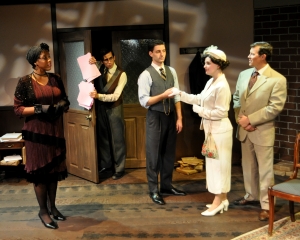
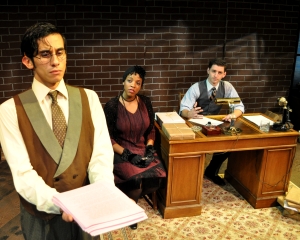
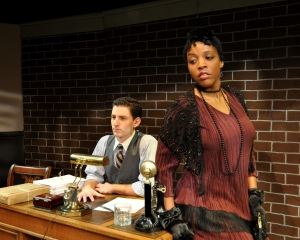
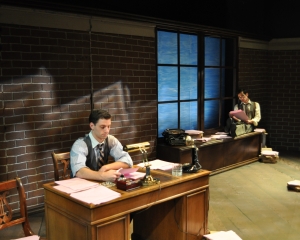
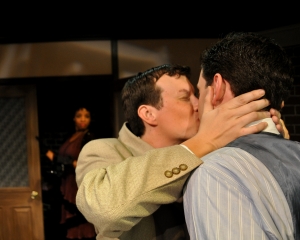
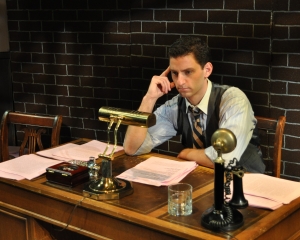

 Since 2007, Steven Stanley's StageSceneLA.com has spotlighted the best in Southern California theater via reviews, interviews, and its annual StageSceneLA Scenies.
Since 2007, Steven Stanley's StageSceneLA.com has spotlighted the best in Southern California theater via reviews, interviews, and its annual StageSceneLA Scenies.







 COPYRIGHT 2024 STEVEN STANLEY :: DESIGN BY
COPYRIGHT 2024 STEVEN STANLEY :: DESIGN BY